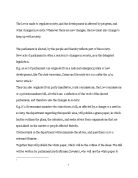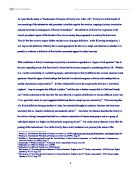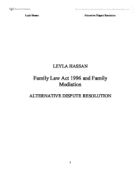The Law fails to reflect and recognise the contemporary family
Discuss
Introduction
This essay shall seek to examine whether the current law fails to reflect the twenty first century modern, contemporary family. It will draw upon recent developments in the law that have go so far to bridge the gap between what was once seen as the family and what is now seen as the family. I shall examine recent legislation such as the Civil Partnership Act 2004 which for the first time in English history allowed homosexual couples to become legally entitled to manly of the legal rights offered to married couples, and assess whether the CPA 2004 has enabled the contemporary view to come in line with the law. Social trends have changed over time and we now see an increase in the amount of people cohabitating. This social trend is set to continue and the rights of cohabitants will be a focal point in this essay, lastly I shall look at the adoption laws that regulate adoption and assess whether the law surrounding adoption is also in line with the contemporary view of the family. Historically, the family was deemed to be confined to husband, wife and children and therefore the focus of this type of family unit could be limited by way of marriage because marriage gives both husband and wife rights and obligations. Even though marriage still plays an important part in the lives of ordinary people, the definition of a family based on the marital status of a couple is diminishing, and recent legislation, as mentioned above the Civil Partnership Act 2004 has enabled a new type of family to appear. Furthermore the Law has seen developments in the area of cohabitation which shapes the way the contemporary view deems what a family is. It is easy to define the functions of a family but it is harder, as academics have found to define who makes up the family. Historically, the definition of family has seen dramatic changes, with kinships being the definition of a family, to defining the family by way of blood to adopting a pragmatic stance and seeing the family as the nuclear family. The rise of the nuclear family post World War two saw this type of family take priority and was seen as the best definition available. However, this ideal has now changed and I shall now proceed with an analysis of the current law and if this law reflects a modern day family.
Weeks comments that the definition of family is being ‘deployed by many people o denote something broader than the traditional relationship based on biology’ Civil partnerships were introduced in 2004 after a long debate about the need to bring in line legal rights for heterosexuals and homosexual couples when deciding to commit to one another. Many see marriage as being the key defining aspect that defines the family unit. With the introduction of the Civil Partnership Act 2004, legal rights akin to marital rights have been given to people that decide to form civil partnerships which has somewhat bolstered the idea of the modern family. One such provisions of the CPA that reflects the modern view of family as including homosexual couples is section 75(3) CPA 2004.Section 75(3) state that when determining parental rights, the word ‘family’ includes the ‘two people who are civil partners of each other’. This, therefore back up the point that homosexual couples are included in the modern definition of the family. The laws aim to include and reflect the modern family being that of a homosexual couple was noted in the seminal case of Fitzpatrick V Sterling Housing Association. After the deceased died the homosexual partner of the deceased Mr Fitzpatrick claimed to have a right under the Rent Act 1977 to succeed to the tenancy. For the purposes of the Rent Act 1977 the then House Of Lords decided that a gay or lesbian couple could be classed as a family. The decision to include homosexual couples within the definition of a family had widespread effect and has impacted on what the law sees as the family. Opining, Lord Slynn stated that to be classed as family one needs to fulfil the requirements of the family and certain hallmarks should be present. For example there needs be a ‘degree of caring, love and commitment’. With the introduction of the CPA it allows homosexual couples to commit to one another and therefore allows them to assert one of the main aims of a family i.e. commitment and be termed as a family unit under the law. However it was noted in Joram Developments Ltd V Sharrat that because the two people did not share sexual relations with one another then they could not be deemed as a family. This would seem to suggest therefore that a key element in defining a family is that of sexual relationships or the possibility of a sexual relationship. This would effectively bar any couple who do not have any sexual relationships as being classed as a family, which in turn does not reflect the modern view of family.







